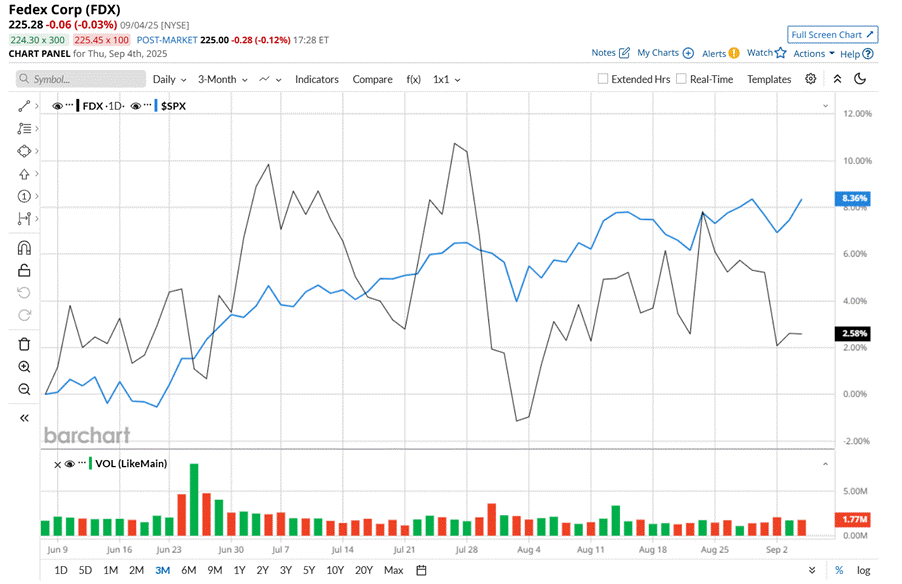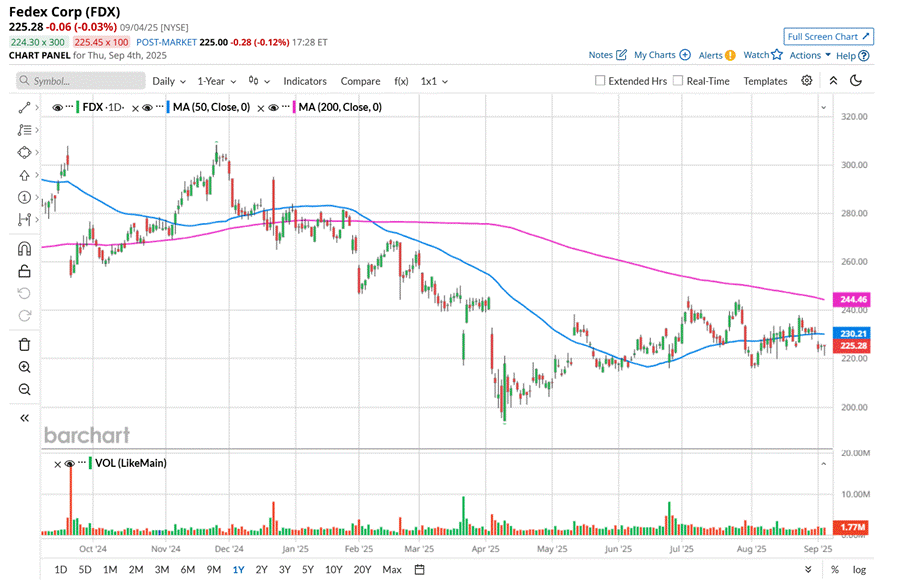/Fedex%20Corp%20delivery%20truck-by%20Sundry%20Photography%20via%20iStock.jpg)
Valued at a market capitalization of $53.2 billion, FedEx Corporation (FDX) provides transportation, e-commerce, and business services. The Memphis, Tennessee-based company offers reliable shipping, freight, and delivery services that connect more than 220 countries and territories.
Companies worth $10 billion or more are typically classified as “large-cap stocks,” and FDX fits the label perfectly, with its market cap exceeding this threshold, underscoring its size, influence, and dominance within the integrated freight & logistics industry. With its extensive global network and commitment to speed, efficiency, and innovation, the company has become one of the most recognized and trusted names in logistics worldwide.
This transportation service provider has slipped 27% from its 52-week high of $308.53, reached on Nov. 25, 2024. Even though FDX stock managed to gain 2.9% over the past three months, it is still underperforming the S&P 500 Index’s ($SPX) 8.9% return during the same time frame.

Over the longer term, FDX stock has slipped 23.1% over the past 52 weeks, significantly lagging behind the benchmark's 17.8% uptick over the same time period. Moreover, on a year-to-date (YTD) basis, shares of FedEx are down 19.9%, compared to SPX’s 10.6% rise.
To confirm its bearish trend, FDX has been trading below its 200-day moving average consistently since late January, and has remained below its 50-day moving average since late July, with minor fluctuations.

FedEx reported its Q4 earnings results on June 24. The company’s higher federal express segment revenue was primarily offset by lower freight segment sales. Due to this, its overall revenue improved marginally year-over-year (YoY) to $22.2 billion, and exceeded the consensus estimates by 2.3%. Moreover, a 60 basis-point improvement in its adjusted operating margin contributed to a 12.2% rise in its adjusted EPS to $6.07, which also topped analyst expectations by 2.4%.
Yet, the market was not buying it, and the shares slipped 3.3% right after the report, a sign that traders saw cracks beneath the surface. FedEx's shares slid as management’s cautious profit outlook and warnings about tariff pressures and industry slowdown overshadowed the otherwise strong Q4 results.
Despite falling behind the broader market, FDX stock has outpaced its rival, United Parcel Service, Inc. (UPS), which declined 34.5% over the past 52 weeks and 33% on a YTD basis.
Despite FDX’s recent underperformance, analysts remain moderately optimistic about its prospects. The stock has a consensus rating of "Moderate Buy” from the 30 analysts covering it, and the mean price target of $265 suggests a 17.6% premium to its current price levels.
On the date of publication, Neharika Jain did not have (either directly or indirectly) positions in any of the securities mentioned in this article. All information and data in this article is solely for informational purposes. For more information please view the Barchart Disclosure Policy here.






